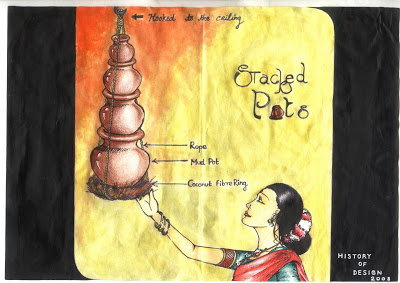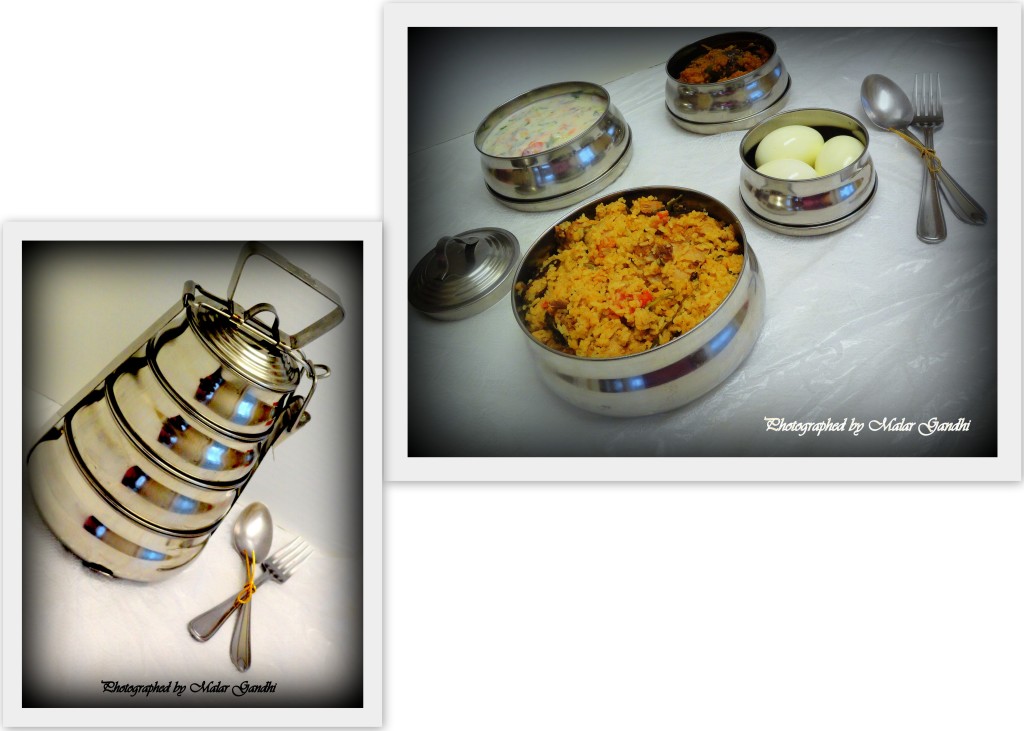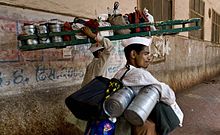Meals On The Wheels – Mumbai Dabbawala
- 23
- December
- 2016
 The Cult of Dabbawala The historic old city of Mumbai (formerly Bombay) is not only defined by crowds, chaos, speed, multi-cultural ethos but also an unique phenomenon, dabbawala. Dabbawalas are actually the secret engine that keeps Mumbai going, the city’s population would be lost without them. No, dabbawala is neither a temple nor a sports icon nor a mysterious spiritual group!They are men in white, who deliver warm home-made meals to customers all across the city. Yes, as simple as that. But, what makes them so special?
The Cult of Dabbawala The historic old city of Mumbai (formerly Bombay) is not only defined by crowds, chaos, speed, multi-cultural ethos but also an unique phenomenon, dabbawala. Dabbawalas are actually the secret engine that keeps Mumbai going, the city’s population would be lost without them. No, dabbawala is neither a temple nor a sports icon nor a mysterious spiritual group!They are men in white, who deliver warm home-made meals to customers all across the city. Yes, as simple as that. But, what makes them so special?
Well, to start with…approximately 5000 men who bring these lunch boxes are mostly illiterate or semi literate (in understanding to the level of alphabets). They move about 2,00,000 lunch boxes on every working day. The time taken for the entire operation is merely three hours and the error rate is one in 16 million transactions. They have not only been documented on BBC and made their way into the Guinness Book of Records and now well entrenched as international celebrities representing the great Indian entrepreneurial management success story. They are ISO certified (International Standard Organization) with 99.99% accuracy, they have the best six sigma rating in the world, and they are invited to give presentations at business universities such as Harvard. Yes, they are pretty good at what they are doing.
Meals on Wheels Dabbawala is an organization, deceptively simple. A ‘dabba‘, in local Indian parlance, is a lunch box; the delivery men are called as ‘dabbawala’. Founded in 1890 by a bunch of British colonists who felt an acute need for home-cooked meals in the absence of satisfactory eateries in those days. The dabbawala movement which started with about hundred men, has now grown into full-fledged work force boasting of 5000 workers. Their intricate method of functioning can stump even the most brilliant of minds that involves foolproof code making, incredible levels of physical strength and flawless teamwork, attributes which get further honed over the years of practice.
Warm Home Made Meals Hungry? What would you prefer? Pizza? from the local fast food joint (30 minutes delivery) or a fresh, warm meal from your home? Actually, most of us, don’t have a choice! It’s either a packed lunch or some outside food grabbed on the go.
Until few decades ago, many cultures, including the Indians, prefer to have a hot home-made meal for lunch. Indians always crave for home cooked food and often choose it over restaurant meals. Many can’t tolerate restaurant treats for more than three days. As a popular saying goes, people stray a little on the local eateries, but they always come back to their usual dal, roti and chawal (lentils, flat bread and rice) – the true Indian comfort food.
So, for those who still believe in eating only hot wholesome homemade meals, the dabbawala system provides an invaluable link to good health and emotional bonding. And the joy of getting warm, home made food delivered to one as specified, at exact time on the dot, is priceless. Mumbai dabbawalas make it happen for a fee as little as ₹ 350 a month (just over US $7).
Mumbai Life Style Mumbai is a commercial capital of India, city of fortuities. It is brimming to the population of 13 million, stretching to 70 kilometers. The suburban railway station is the backbone of the transport system in the city. It moves 6.1 million commuters of 200 km route length by more than 2000 service trips daily. Early morning departure and late night home coming within the average of three hours of travel time is an excepted routine for working Mumbaittes. Time constraints deprive a good breakfast. Battle to board a train, needs both hands to be free too. Hence carrying a lunch bag is simply out of question. Deprivation of a good breakfast, economy in expenses, health and hygiene, dinning habits make the middle-class working people of Mumbai cherish home-made lunch at their work places.
Though international fast food chains have mushroomed all over the city, people are fast waking up to the health hazards connected with eating at restaurants, canteen and fast food joints frequently. And home-made food with its timeless appeal and high hygiene. The phenomenon of both partners working and there being no-one to cook and send food from home, however, is fast lending strength to the private caterer who not only cooks customized lunches but also dispatches them to customers.
The shelf life of most of these Indian foods are just 4-5 hours, therefore timely delivery to right owner decides the quality of service. As religion dictates food habits, mix-up of lunches will defeat the very purpose of the service and its business potential. Hence, speed and precision in handling are most crucial. One lunch box ships, hands in transits at least six times, therefore it reaches its consumer in his/her office and same in the case of its return journey as an empty box. All handled by 5000 dabbawalas, except the train, everything is manually handled with no technologies at all.
 The coding system employed to ensure that the right lunch box reaches the right person could appear mind boggling complicated but when decoded, comes straight forward. Specific codes and colors are allotted for the places of collection and destinations; these include the railway stations of collections, areas of delivery, building names, floor numbers etcetera.
The coding system employed to ensure that the right lunch box reaches the right person could appear mind boggling complicated but when decoded, comes straight forward. Specific codes and colors are allotted for the places of collection and destinations; these include the railway stations of collections, areas of delivery, building names, floor numbers etcetera.
What has been awed about the dabbawalas is how they function so accurately, without the use of any modern technology, only recently they have begun accepting orders via SMS. In today’s world of six sigma quality standards and super technologies for supply chain and logistics management, it is a miracle that the failure or mistakes in the service of the Mumbai dabbawalas is only in 16 million ent deliveries, that too by accidents or acts of nature and not by human error, despite the fact that human beings are everything in this service.
Success Story The success of their system has called much attention from business schools as well as tourists and now they have a “A Day with Dabbawalas” itinerary where you can spend a day in Mumbai helping them out – like what famous business man, Richard Branson did on one of his visits to India.
A BBC crew filming dabbawalas in action was amazed at their speed. Following the dabbawala wasn’t an easy task, the film crew quickly lost their subject in the congestion of the train station. Later, they found other fast moving dabbawalas, but not their subject… and at customer’s destination, the lunch had been delivered, long before the film crew arrived, the documentary noted wryly. So, how do they work efficiently?
Population has increased, distances multiplied, complexities and sophistication in urban life increased traffic conjectures and bottle necks are mind boggling. But, their technology of bicycles, hand carts and trains! Yet, they are the best in the world for customer care, time management and quality of service. These men in white are easily identifiable with a white Gandhi cap, it is mandatory for their job, as they could be easily spotted out in the crowd.
The system the dabbawalas have developed over the years revolves around strong teamwork and strict time-management. They claim to be descendants of the ancient warrior clan, the Mawlas, carryout their delivery duties keeping the motto “work is worship” firmly fixed in mind. All of them are teetotalers, most of them do not smoke, practice vegetarianism and are willing to carry 70 kg of weight. They are all equal shareholders, equal income for equal effort, not results!
The 120-year old history of dabbawalas has neither witnessed a single day strike nor closure of activities, be it heavy rains or even when terror struck the city! Yes, their reputations are radically distinct. Since the association was formed in 1890, there has not been a single record of workers strike nor police cases against any dabbawala. The trust quotient is so high that people have started using lunch box to even exchange love letters and valuables.
Celebrity Status The New York Times, reported in 2007 that the 125-year-old dabbawala industry continues to grow at a rate of 5–10% per year. Harvard Business School has produced a case study of the dabbawalas, urging its students to learn from the organization, which relies entirely on human endeavor and employs no technology. Paul Goodman, professor of organizational psychology at Carnegie Mellon University, made a documentary on the dabbawalas. He says, “Most of our modern business education is about analytic models, technology and efficient business practices,” whereas, dabbawalas, by contrast, focus more on “human and social ingenuity”.
Firms, both Indian and foreign, are similarly curious. Tata, Coca-Cola and Daimler have all invited dabbawalas to explain their model to managers. A British High Commission official went as far as to remark that no other city anywhere else in the world or even in India, had such an intricate yet smoothly functioning system. Much fame came when Prince Charles visited them in November 2003 (he had to fit in with their schedule, since their timing was too precise to permit any flexibility). In Salman Rushdie’s 1988 novel “The Satanic Verses”, one of the main characters, Gibreel Farishta, worked as a dabbawala before going on to become a film star. The deliverymen no longer need a career change to get noticed.
© 2015 Malar Gandhi, All Rights Reserved. This material may not be published, broadcast, rewritten, or redistributed.
Recipes
Recent Posts
- Saturday Special – Saathvik Meals
- Kebab – Taking only one bite at a time!
- Coin Parotta – Small Things Matter
- Bonda – Rainy Day’s Snack
- Chappathi Making Board & Rolling Pin – Matters!
Recent Comments
- MahiArun on Idichakka Thoran – Kerala Special
- veena on Idichakka Thoran – Kerala Special
- M.P.Gandhi on Idichakka Thoran – Kerala Special
- M.P.Gandhi on Banana Milkshake – Wholesome Meal
- Manjula on Banana Milkshake – Wholesome Meal







